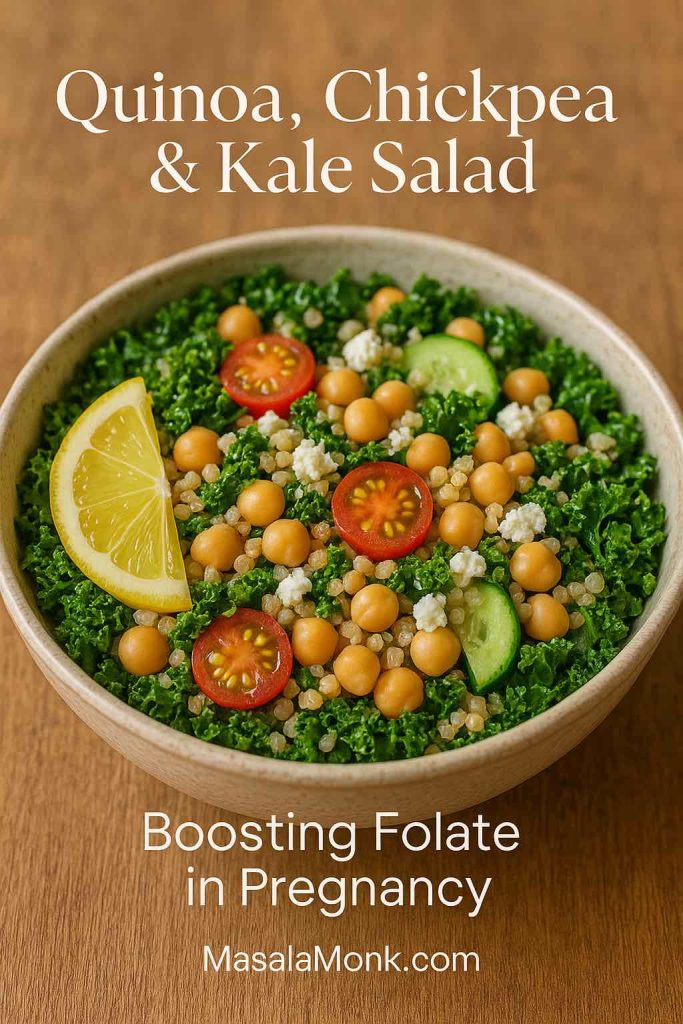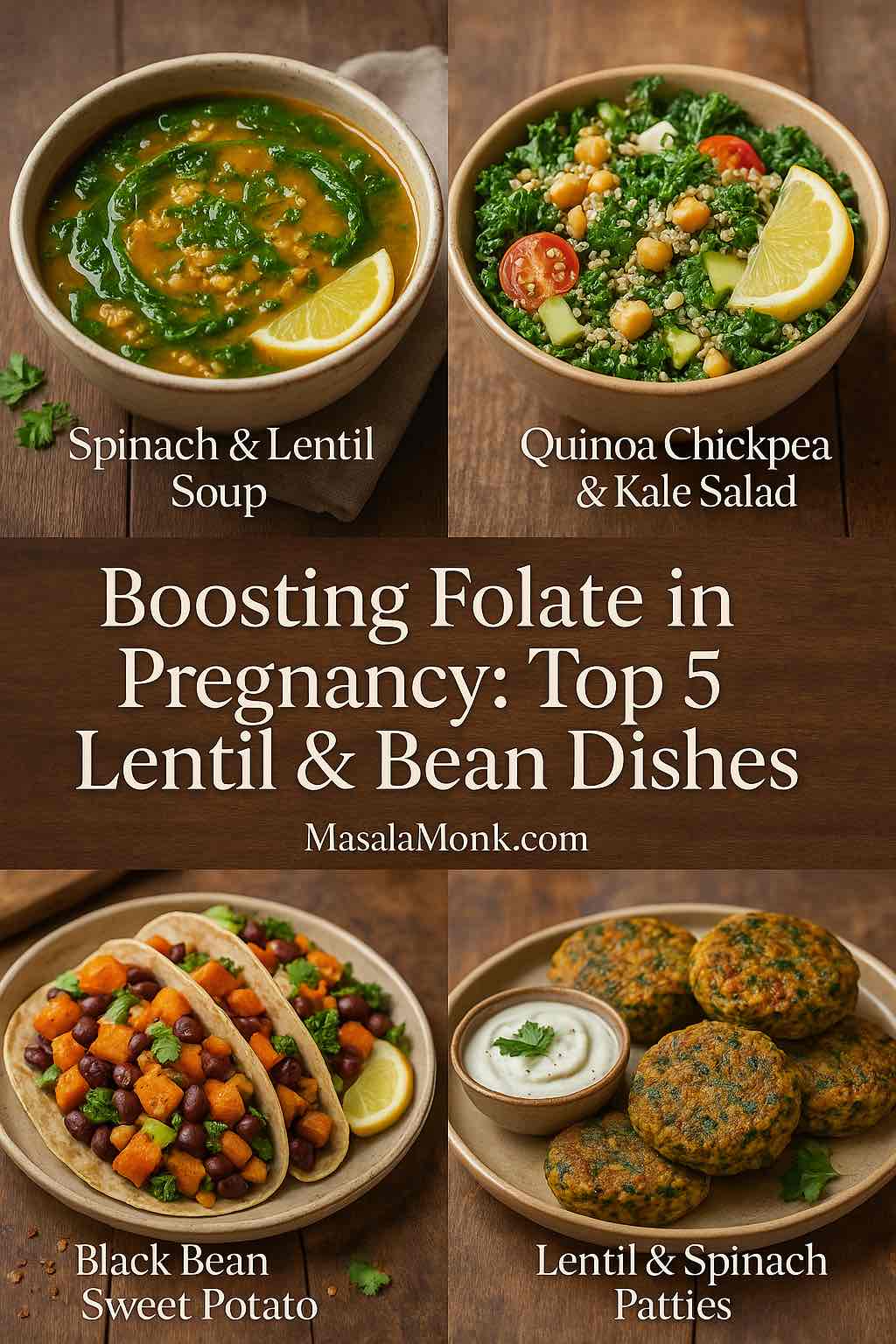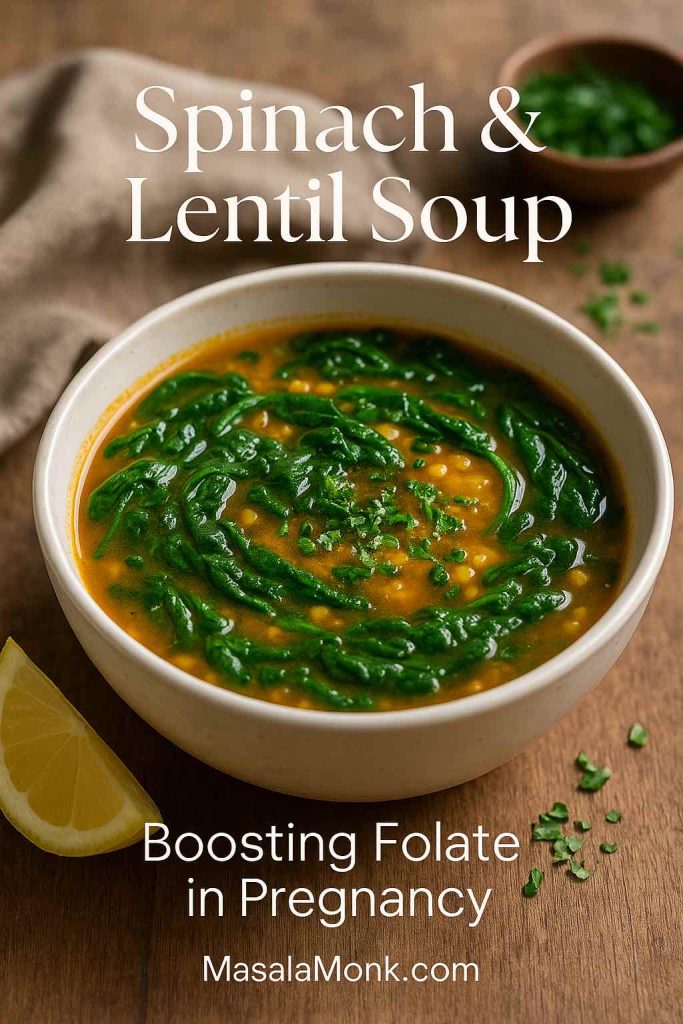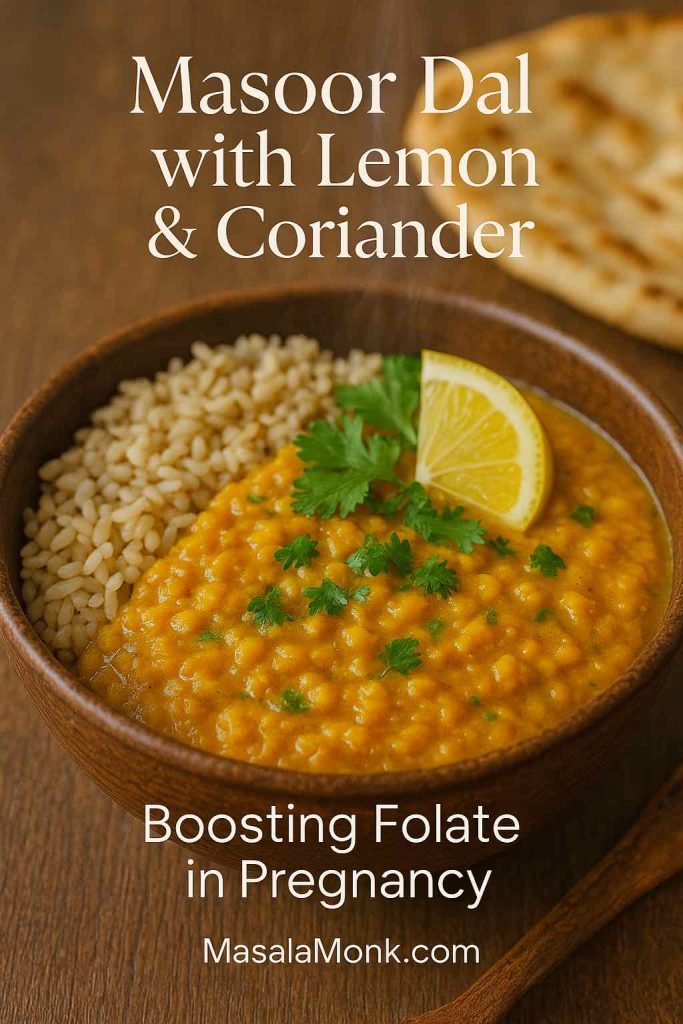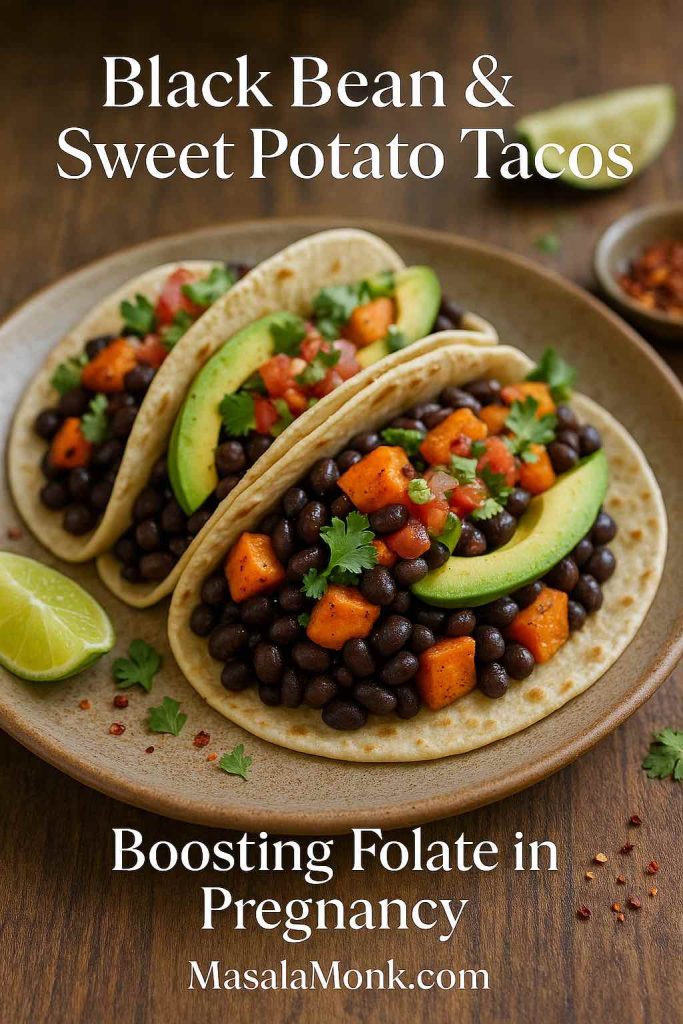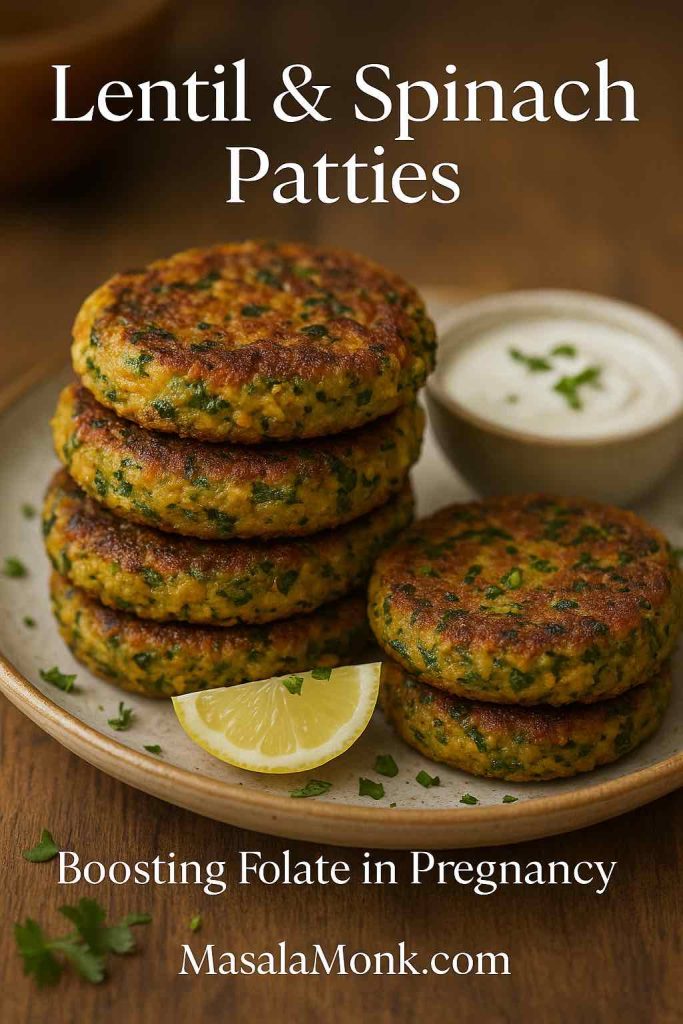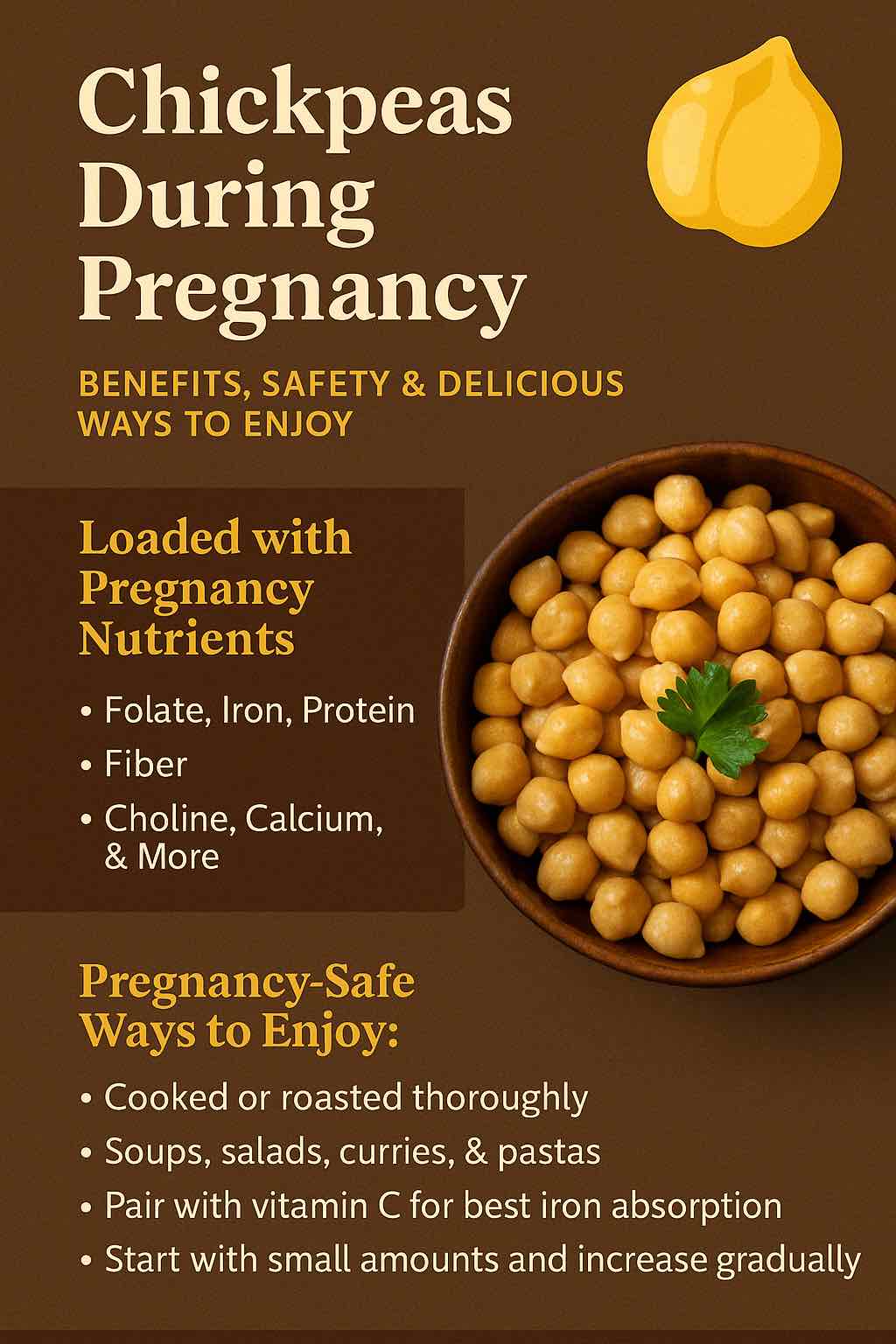
1. The Humble Chickpea — A Pregnancy Powerhouse
Whether you call them chickpeas, garbanzo beans, kabuli chana, or black chana, these little legumes have nourished cultures for centuries. Now, modern research is catching up to what traditional diets have known all along — chickpeas can be a pregnancy superfood when prepared the right way.
Packed with folate, iron, protein, fiber, and choline, chickpeas deliver nutrients essential for both mom and baby. But here’s the catch: while they’re nutritious, there’s a right (and safe) way to eat them during pregnancy — and a few things to watch for.
We’ll explore their benefits, risks, trimester-wise tips, and even mouth-watering recipes (plus snack ideas like roasted chana and protein-rich soups) to make chickpeas a happy staple on your plate.
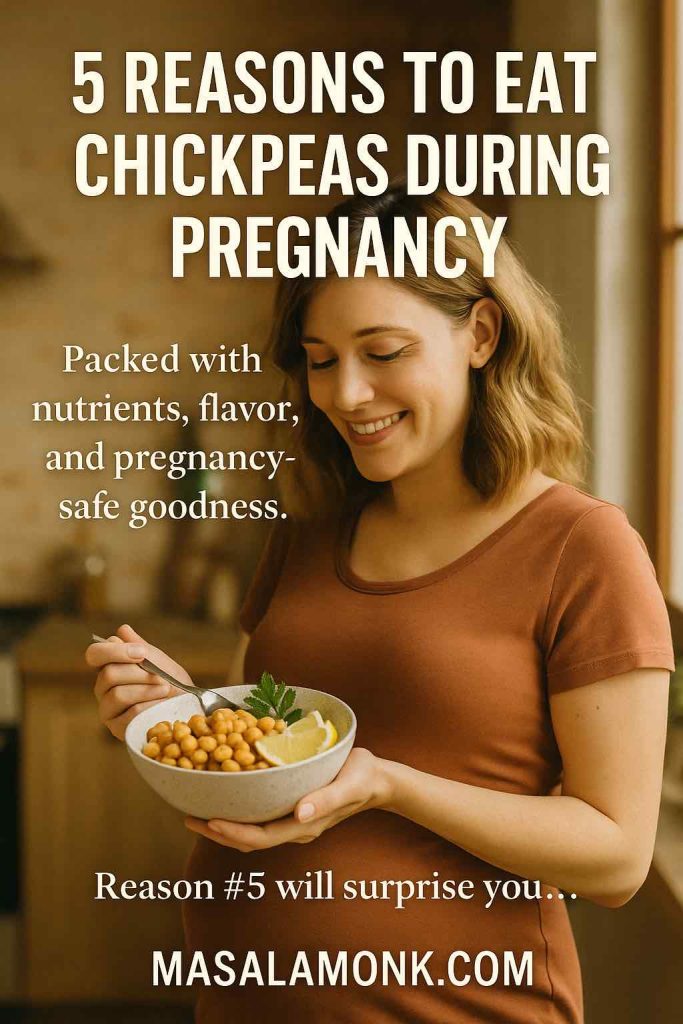
Also Read: Boosting Folate in Pregnancy: Top 5 Lentil and Bean Dishes
2. Why Chickpeas Shine in Pregnancy Nutrition
Just one cup of cooked chickpeas contains:
- Folate (~280 µg): Crucial in the first trimester for reducing the risk of neural tube defects.
- Iron (~4.7 mg): Supports oxygen transport and helps prevent anemia.
- Protein (~14 g): Fuels the development of your baby’s tissues and your own muscle health.
- Fiber (~12 g): Aids digestion, prevents constipation, and supports stable blood sugar.
- Choline (~70 mg): Supports brain development and memory function in your baby.
- Calcium, Magnesium, Zinc: Key for bone, nerve, and immune health.
📌 Latest research: A 2023 Frontiers in Nutrition study found that low maternal fiber intake was linked to delayed cognitive and motor skills in infants. Chickpeas are a high-fiber, plant-based way to help bridge that gap.
💡 Pair chickpeas with vitamin C-rich foods like tomatoes, lemon, or bell peppers to enhance iron absorption — you can find this in recipes like our Folate-Rich Kale & Quinoa Salad.
Also Read: Combat Anemia During Pregnancy: 5 Iron-Infused Recipes
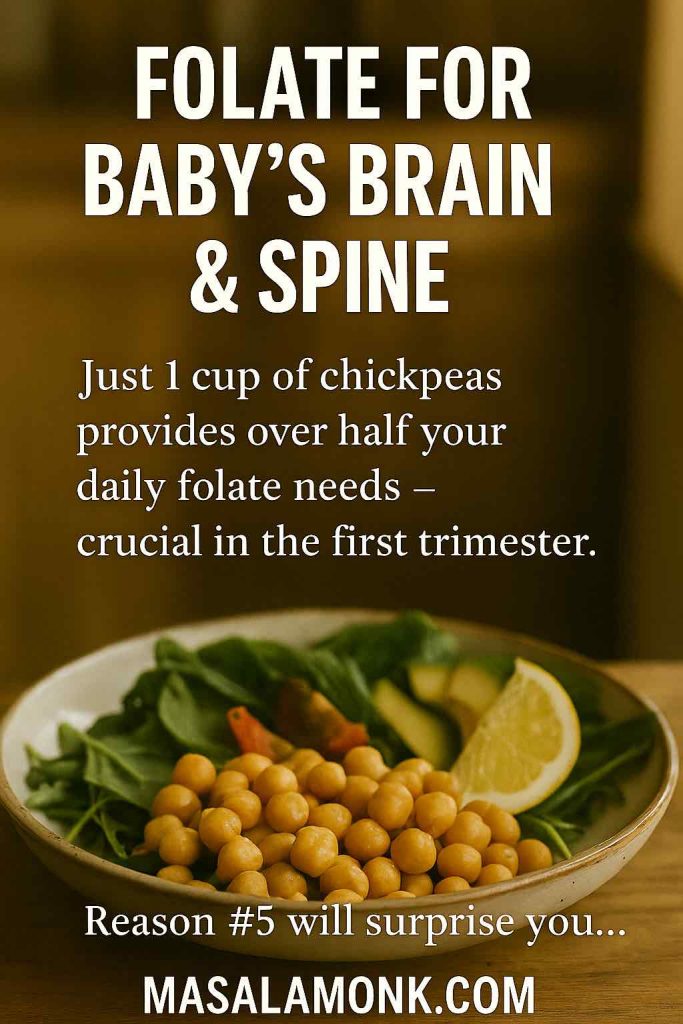
3. Safety First — How to Eat Chickpeas During Pregnancy
Chickpeas are safe to eat during pregnancy — but only if they’re cooked or roasted thoroughly. Raw or undercooked chickpeas (including inadequately rinsed canned beans) can cause digestive distress, and in rare cases, foodborne illness.
Pregnancy-Safe Chickpea Tips:
- Soak and cook dried chickpeas until soft — soaking helps reduce gas-causing compounds.
- Rinse canned chickpeas well to remove excess sodium and canning liquid.
- Roast fully if making crunchy snacks like roasted chickpeas.
- Start small if you’re new to legumes, increasing portion sizes gradually.
- Mix it up — try chickpeas in soups, salads, curries, and even pasta (like in our High-Protein Pasta Ideas).
💬 Real mom experience: “I lived off roasted chickpeas for days. They kept me full, gave me energy, and didn’t spike my blood sugar.” — via Reddit
4. Chickpeas by Trimester — How to Enjoy Them at Every Stage
Pregnancy isn’t one-size-fits-all, and neither is your diet. Your tolerance, cravings, and digestion will shift from trimester to trimester. Chickpeas can adapt to those needs — here’s how:
First Trimester
- Focus on folate-rich, gentle preparations like chickpea soups or hummus. These are easy to digest if you’re battling nausea.
- Try our comforting Vegan Protein-Rich Chickpea Soups for warmth and steady energy.
Second Trimester
- Energy returns, and digestion stabilizes. This is the time for fiber-packed salads and curries.
- Add chickpeas to our Folate-Rich Kale & Quinoa Salad or make a batch of chana masala from our Vegetarian High-Protein Meal Prep Ideas.
Third Trimester
- You’ll need extra protein, iron, and calcium for baby’s rapid growth.
- Opt for hearty chickpea stews, roasted snacks, or chickpea pasta dishes from our High-Protein Pasta Ideas.
Also Read: Fetal Development: Pregnancy Trimesters
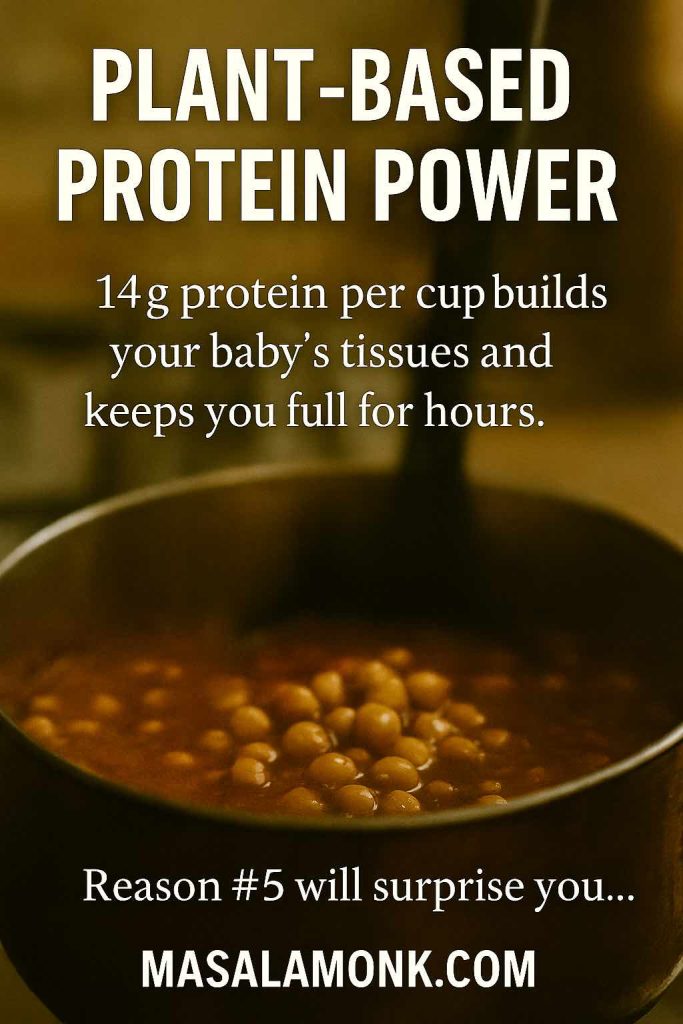
5. Delicious Pregnancy-Friendly Chickpea Recipes
You don’t need to stick to one boring preparation — chickpeas are incredibly versatile. Here are some pregnancy-safe, drool-worthy ideas:
- Classic Chana Masala
- Rich in iron, folate, and flavor. Pair with brown rice or whole wheat roti for a complete meal.
- Try it from our High-Protein Vegetarian Meal Prep guide.
- Chickpea & Avocado Toast
- Smash boiled chickpeas with ripe avocado, lemon juice, and a sprinkle of salt — pregnancy-friendly and quick.
- Featured in 5 Sugar-Free, Protein-Packed Snacks.
- Mediterranean Chickpea Salad
- Combine chickpeas, cucumber, tomatoes, parsley, lemon juice, and feta (pasteurized).
- A cooling option for warmer months.
- Chickpea Pasta Primavera
- Use chickpea pasta for extra protein and top with sautéed vegetables.
- See our High-Protein Pasta Dishes for inspiration.
- Roasted Spiced Chickpeas
- Toss cooked chickpeas in olive oil, cumin, and smoked paprika; roast until crispy.
- Ideal for mid-morning munchies or movie night.
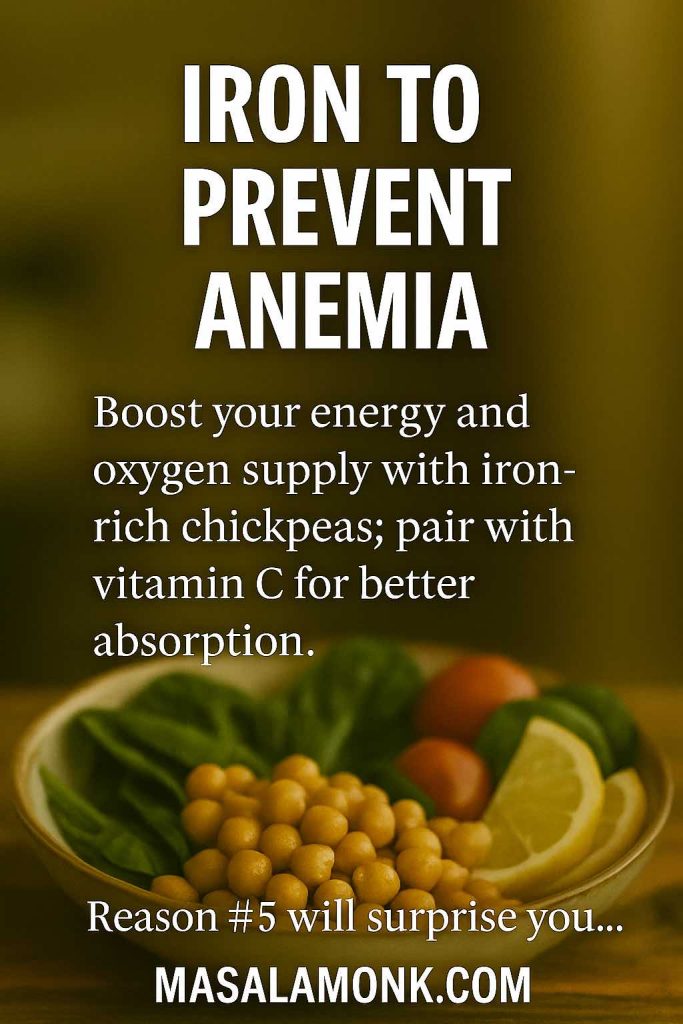
6. Real-Life Pregnancy Stories with Chickpeas
Sometimes, science meets real life — and the combination is powerful. Here’s what moms-to-be have shared about their chickpea experiences:
- The Raw Surprise
“I was eating chickpeas straight from the can without cooking them… and had terrible stomach aches. The label literally said ‘cook thoroughly.’ Once I stopped, I felt better instantly.” — Reddit user - Roasted Rescue
“I lived off roasted chickpeas for days. They were crunchy, satisfying, and kept me full between meals.” — BabyBumps forum - Cravings with Consequences
“My main pregnancy craving was chickpeas and spinach — and now my toddler loves chickpeas too.” — BeyondTheBump forum
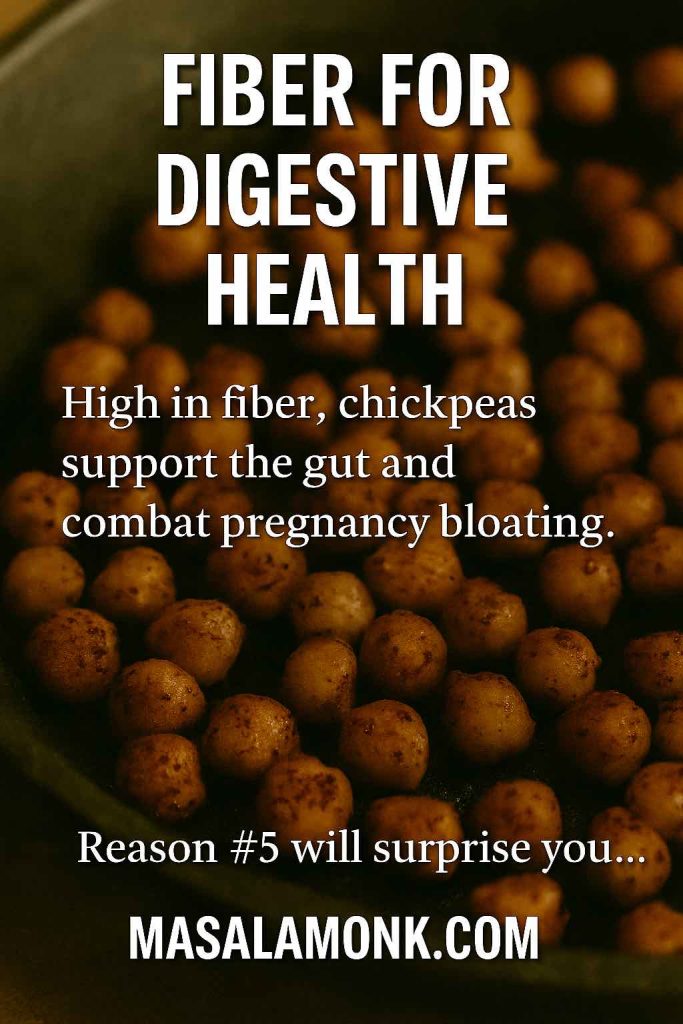
7. Risks & Who Should Be Cautious
Chickpeas are generally safe for most pregnant women, but there are a few scenarios where you’ll want to be mindful:
- Gas & Bloating
Chickpeas are high in fiber and certain oligosaccharides, which can cause discomfort if introduced suddenly. If you’re prone to bloating, start with small servings. - Allergies
Rare but possible — if you’ve had allergic reactions to legumes (like peanuts or soy), consult your doctor before adding chickpeas to your diet. - Gestational Diabetes
While chickpeas have a low glycemic index, portions still matter. Pair with vegetables and healthy fats to keep blood sugar stable. - Kidney Stones
Chickpeas contain oxalates, which can be a concern if you’re prone to kidney stones. Speak with your healthcare provider for personalized advice.
📌 Tip: Cooking chickpeas thoroughly and rinsing canned varieties can reduce compounds that cause digestive discomfort. Recipes like our protein-rich soups or snackable roasted chana make them easier to digest.
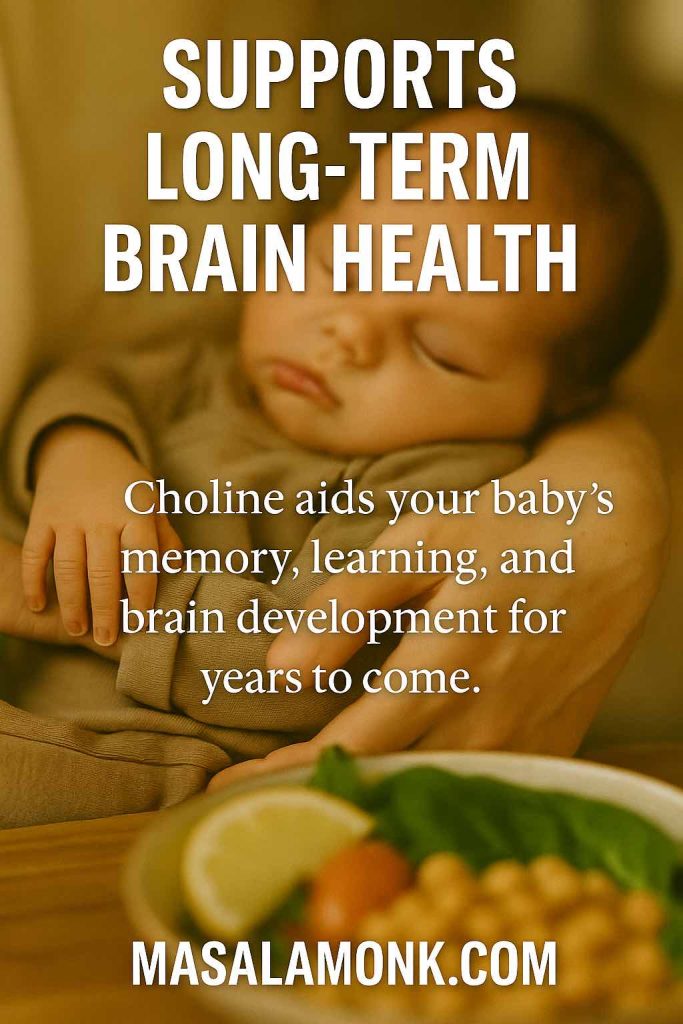
8. The Bottom Line — A Pregnancy Staple Worth Keeping
Chickpeas are more than just a pantry filler — they’re a pregnancy-friendly powerhouse packed with protein, fiber, folate, and iron. The latest research shows their benefits go beyond basic nutrition, potentially supporting your baby’s brain development, digestion, and overall growth.
From creamy hummus to tangy salads, from hearty curries to crispy roasted snacks, chickpeas are versatile, budget-friendly, and globally loved. By preparing them safely and pairing them with complementary foods, you can make them a regular — and enjoyable — part of your pregnancy diet.
Ready to Cook?
Try one of our pregnancy-friendly chickpea recipes today:
- 5 Vegan Protein-Rich Chickpea Soups for Pregnant Women
- 10 Vegetarian & High-Protein Meal Prep Ideas
- 5 Sugar-Free, Protein-Packed Snacks for Pregnancy Nights
💬 We’d love to hear from you!
Which chickpea recipe are you trying first? Share your favorite way to eat chickpeas during pregnancy in the comments — your tip might inspire another mom-to-be!
FAQs
1. Are chickpeas safe to eat during pregnancy?
Yes — chickpeas are safe when cooked or roasted thoroughly. Avoid eating them raw to prevent digestive discomfort and potential foodborne illness.
2. What nutrients in chickpeas benefit pregnancy?
Chickpeas are rich in folate, iron, protein, fiber, choline, and minerals like calcium and magnesium — all vital for your baby’s growth and your own health.
3. Can chickpeas help prevent constipation in pregnancy?
Yes. Their high fiber content supports healthy digestion and helps reduce pregnancy-related constipation.
4. Are chickpeas good in the first trimester?
Absolutely. They’re an excellent source of folate, which is crucial for neural tube development in early pregnancy. Soft preparations like hummus or soups are ideal.
5. Will eating chickpeas cause gas or bloating?
They can, especially if you’re not used to high-fiber foods. Soak dried chickpeas before cooking, rinse canned ones, and introduce them gradually.
6. Can I eat roasted chickpeas during pregnancy?
Yes. Roasted chickpeas are a healthy, crunchy snack option — just make sure they’re fully cooked and seasoned lightly to avoid excessive salt.
7. Are canned chickpeas safe while pregnant?
Yes, if rinsed thoroughly to remove excess sodium and preservatives. Always check the expiration date and ensure proper storage.
8. Do chickpeas help with anemia in pregnancy?
They can contribute — chickpeas contain plant-based iron. Pair them with vitamin C-rich foods (like lemon or tomatoes) for better absorption. Read more about Anemia in Pregnancy: Impact and Solutions
9. Can I eat chickpeas if I have gestational diabetes?
Yes, in moderation. Chickpeas have a low glycemic index, but portion control is important. Pair them with vegetables and healthy fats for balanced blood sugar. Read more about What Are the Symptoms of Gestational Diabetes?
10. What are some easy chickpea recipes for pregnancy?
Try chana masala, chickpea & avocado toast, Mediterranean chickpea salad, chickpea pasta, or roasted spiced chickpeas. See our High-Protein Meal Prep Ideas for recipes.

